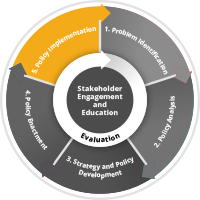
Policy Implementation
Once a policy is enacted or adopted, Local Health Departments (LHDs) and other organizations play an important role in educating the community about these changes, facilitating the adoption and implementation of new practices, and ensuring monitoring and enforcement.
There are a number of ways you can work with a community advisory board to translate the enacted policy into action, monitor uptake, and ensure full implementation:
This Guide and website are provided for informational purposes only. Note that certain restrictions apply to the use of CDC funds for impermissible lobbying. For more information concerning such restrictions see the CDC Anti-Lobbying Guidelines.

